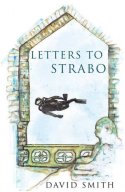
BRITAIN is triangular in form; its longest side lies parallel to Keltica […] The greatest portion of the island is level and woody, although many tracts are hilly. Their atmosphere is more subject to rain than to snow; even in their clear days the mist continues for a considerable time, in so much that throughout the whole day the sun is only visible for three or four hours about noon.
Strabo, Geography Book IV, Chapter V
Finn, despairing of his hot and cold relationship with his french art gallery friend Francoise, crosses over to England from Paris to meet up with Gwendoline Bryon, a scholar and Strabo expert in Milton College Cambridge. Right from the start she poses a challenge to Finn, she’s not at all the dusty archivist he expected:
“In the flesh she was quite different from what I’d imagined. Small, even waif-like, with short reddish hair and a plaited fringe threaded with beads. Her cherubic dimples, bitten down nails and slightly whimsical smile made her look like a schoolgirl rather than a woman in her late twenties.”
In fact she takes charge from the beginning, showing him around Cambridge and putting him right on the basic facts about Strabo in the depths of the college library. But her mischievous smile and no-nonsense enthusiasm quickly begin to get under Finn’s skin:
“To her credit, she didn’t flinch at all when I opened the door wearing only my shorts. She asked if I wanted to join her for lunch. I nodded and went to close the door, but before I knew it she’d barged into the room and was opening up the drapes to let in the bright sunshine. She was clearly intent on taking charge.
‘Nice legs,’ she said, hardly looking up from her book.”

Over the weekend, Finn falls somewhat in awe of her, so when she invites him to supper in the college hall he goes along and then joins her for an evening punt trip along the Backs that runs past the main colleges:
“Someone once said about girls that: “They are either very pretty or very clever or very sweet but never all three.” In Gwen’s case that was a load of malarkey. She absolutely nailed all three at once, but not in any classic mixture. She wasn’t pretty in a girlie sense and you couldn’t have described her blue-stocking confidence as merely sweet, but she was fearsomely clever. There was something inherently appealing about the way her passion for her subject shone through. What’s more, her slightly croaky voice was hellishly sexy.”
Fortunately sense prevails and despite a couple of awkward encounters, they settle instead for a brother-sister relationship which progresses throughout the novel. She giving him tips for where he should go on his travels, he seeking her advice. It’s a sweet relationship that develops ultimately into a deeper friendship.
“‘Why are we holding hands?’ she asked.
‘Sorry, it just seemed…dark.’
‘Ah, my knight in shining armour,’ she joked and pulled me closer.”
At the end of their long weekend they take a trip to London to see the sights. after a day touring sites and galleries, Gwen is keen to take Finn to a London play and they are lucky enough to see two future giants on the English stage, Judie Dench and Ian McKellen in an Ibsen play called Pillars of the Community.

It proves quite a eye-opener to Finn, with its anti-capitalist and feminist messages. Right up Gwen’s street though he thinks. Then, during the interval they are drinking in the bar where they both spot a poster for a performance of Tom Stoppard’s play Travesties. Finn is struck by some lines on the poster. His next destination has been determined.
“During the interval, we went to the bar and stood drinking rancid warm white wine, while admiring a display of film posters from the previous season’s performances. Gwen pointed out the one for Stoppard’s Travesties. She’d been to the performance herself. That was quite a coincidence because I’d seen the same play before I left the States. I read out a great passage written on the poster:
I learned three things in Zürich during the war. I wrote them down. Firstly you’re either a revolutionary or you’re not, and if you’re not you might as well be an artist as anything else. Secondly, if you can’t be an artist, you might as well be a revolutionary… I forget the third thing.”
So next stop Zurich, via Heidelberg and Basel and an encounter with James Joyce.

